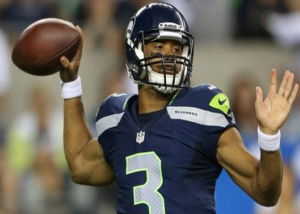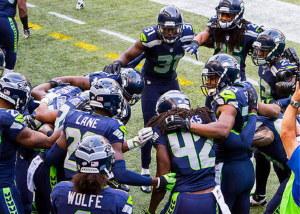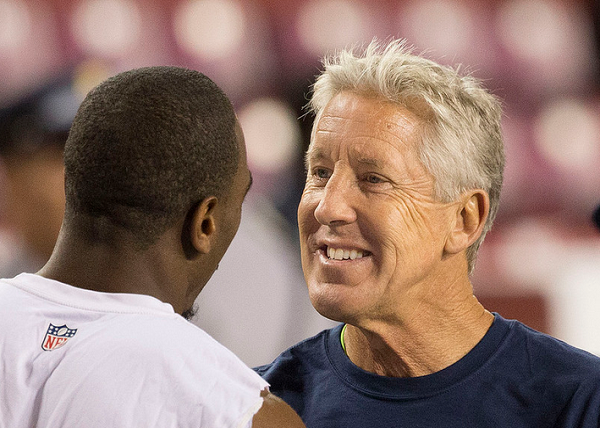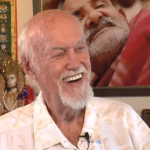Pete Carroll has developed an innovative and mindful approach to coaching NFL players that has produced conscious and confident champions in Seattle.
American football is an intense game. The extreme nature of its physicality is matched only by the obsessive nature of those who study the game and devise its strategies. For those who play it at the highest level, it is a combination of the chess board and the gladiator arena. Success means achieving pin-point accuracy and making split-second decisions amidst inhuman displays of speed and violent, often stomach-turning collisions.
Add to this scenario, the lights, cameras, tens of thousands of roaring fans keeping noise at a crescendo and the general anxiety of knowing that you’re a highly paid athlete who is expected to perform in a business oriented league that passes on outstanding players every year, and you still can’t imagine how stressful it must be to play on Sundays in the NFL.
For generations of coaches, the secret to performing in such a chaotic environment has been practicing in a near-militant fashion that stresses discipline, repetition and conformity to a proven system; but Pete Carroll, head coach of the Super Bowl champion Seattle Seahawks, has reached the pinnacle of his profession using a different approach.
Carroll has infused the Seahawks organization with mindful practices and philosophies, which he believes to be integral to both the team’s success and the maximum development of individual players.
The Seahawks organization has an entire department with specialized employees who are concerned with player health and performance. Headed by veteran trainer, Sam Ramsden, the staff includes a life skills consultant/addiction counselor, Dirk Eldredge, and a high-performance sports psychologist, Mike Gervais.
Gervais had notable success with pro-athletes and Olympians before being hired by the Seahawks, and he is their resident guru and leader in exercises designed to heighten awareness and build confidence.
As part of their regular training schedule and preparation for games, Seahawks players engage in group and individual meditation and visualization exercises. They also participate in yoga sessions, which were optional when Carroll began implementing his system but were so well-received by players that they became part of the mandatory regiment.
Beyond these activities, which are new to the NFL while they are typical in the mindful community, Carroll holds team practices that are unique to professional football. Filled with high-energy coach/player interaction, deafening music and an abundance of activity, practices are designed to be as chaotic as possible so players can simulate achieving awareness in the face of extreme distraction and stress.
Carroll’s philosophy is that if players can learn to quiet their minds in such an environment, they can have success no matter the odds during game-time.
In addition to training quieter minds, Carroll puts a great amount of emphasis on positive energy. Players are discouraged from swearing or bringing negative emotion to the field. The coaches celebrate players for their unique strengths and personalities and even their small victories in practice. In turn, the players celebrate each other for their individuality. When an individual makes a mistake, they are not harangued. Rather, they are properly coached to correct the mistake.
Wide receiver Doug Baldwin has benefited from this positive atmosphere. Gervais trained Baldwin to visualize personal highlight reels whenever he feels moments of doubt, and his performance has improved since implementing the technique. His teammate, safety Earl Thomas, meditates daily and believes it to be necessary to gain his balance and rhythm as an athlete.
In an interview with mindful, Carroll said, “I’m trying to create a really thriving environment. That means making it as rich as possible. So there’s noise, competition, activity, energy—like when we play. It’s better than a pristine vacuum-type environment, as far as I’m concerned. Because we never play there.”
While “mindfulness” is not part of his team’s daily vocabulary, Carroll admits that it is paramount in what the organization is trying to achieve: the ability to be present in each moment, each practice and each game as it occurs, and to take focus away from the surrounding environment and the opposition and lend it toward the immediate goal.
To Carroll and the Seahawks, the immediate goal is always an internal one. The most important competition occurs within each member of the organization. They are concerned with performing their best, and they consider result-based, or exterior, goals to be a distraction.
Over the last two seasons, the Seahawks have been on top of the league. Last year, they boasted the best defense in the NFL and won the Super Bowl decisively over a Denver Broncos squad that, statistically, had one of the best offenses in NFL history (much to the chagrin of MeetMindful’s home-base community).
At the time this article was submitted, the Seahawks were preparing to take on the New England Patriots in their second Super Bowl appearance in two years. By the time this is published, there could be two Lombardi Trophies in Seattle.
Credit must be given to the Seahawks’ incredible talent and hard work in football-related preparation. Their skills are honed and their strategies are brilliantly constructed, but there is something about the team that wills wins. They have achieved victory again and again, in the face of adversity and in key moments, and there appears to be no amount of pressure that can make them fold.
This mindfulness thing must be working.
 At least, the players seem to think so. Led by Russell Wilson, a third-year quarterback who is the poster child for high performance in clutch situations, the team believes in the program that Carroll has set forth.
At least, the players seem to think so. Led by Russell Wilson, a third-year quarterback who is the poster child for high performance in clutch situations, the team believes in the program that Carroll has set forth.
“I truly believe in positive synergy, that your positive mindset gives you a more hopeful outlook, and belief that you can do something great means you will do something great,” said Wilson in an ESPN interview.
Carroll has had an interest in coaching the individual in a team environment since his early days as an assistant at the University of the Pacific. He became well versed in the texts of performance psychology such as Abraham Moslow’s study on the “hierarchy of needs” and “self-actualization” and Timothy Gallwey’s The Inner Game of Tennis.
Moslow’s research showed that high achievers often experienced moments of clarity that unlocked hidden potential. Gallwey believed that poor performance on the court was directly related to an athlete’s mental state and he suggested that stillness of mind could allow an athlete to see past distractions and focus on the moment.
Adding to those philosophies, Carroll became acquainted with the Native American notion of the “long body,” which is the belief that many members of a tribe can connect with each other, beyond their individual forms, to move and achieve as one body.
The coach took these pieces of performance psychology and developed a philosophy that he thought could work for a football team, but it wasn’t until after the 1999 NFL season, when Carroll was unceremoniously relieved of his duties as the head coach of the Patriots, that he began to put his ideas into play.
He took a short time off and then returned to coaching at the University of Southern California (USC), determined to take a different approach to developing players. In ten seasons the Trojans achieved seven top-ten finishes and won two national championships.
Carroll developed a reputation for being an energetic (rah-rah), player-friendly coach, and after his tenure at USC, he accepted the opportunity with the Seahawks in 2010. Since then, his coaching style has become even more focused on catering to the uniqueness of each player and getting the best out of each individual.
Gervais, his resident expert, has worked with several NFL teams but has never seen an organization embrace mindful practices so openly and wholeheartedly. He explains that Carroll has, “created a culture that has created a fertile ground for people to explore their own best self.”
Gervais believes that by celebrating individual players in their entirety, the culture makes people feel important and that the program allows for the, as he puts it, “exploring with a person, collectively and individually, of what’s possible.”
I am a slightly frustrated, die-hard fan of the San Francisco 49ers, who compete in the same division as the Seahawks. I enjoy Seattle’s success about as much as Bronco fans do, but I have to appreciate what they have built. Under Carroll’s tutelage, they have found a way to develop quiet minds and aware competitors, and that is innovative and mindful at the same time. They must be applauded for their work.
[images: via Keith Allison on flickr, vivi1867 on flickr , M I K E M O R R I S on flickr]











